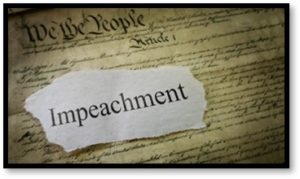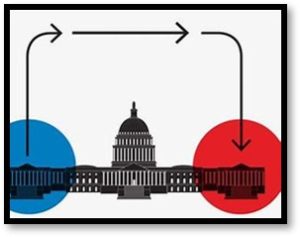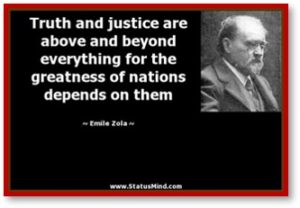Monday Author: Susanne Skinner
 The United States is conducting impeachment proceedings against the President of the United States and it’s playing out in a media-driven environment. Coverage dominates television, radio and print, making it hard to escape, and even harder to understand.
The United States is conducting impeachment proceedings against the President of the United States and it’s playing out in a media-driven environment. Coverage dominates television, radio and print, making it hard to escape, and even harder to understand.
I distract myself with the occasional Hallmark movie and my Christmas Cookie Palooza, but political affiliations aside, there is some serious S#%t going down. I hereby admit my ignorance of the process of impeachment.
Our broadcast culture creates no shortage of opinions and generates too many ‘facts’ to sift through while searching for truth. My ability to follow along requires an in-depth understanding of the way impeachment works, something I am currently lacking.
Politics is not a focus of The Next Phase Blog, but in the interest of education, I offer a detailed refresher of what impeachment means as a government check and balance and to these United States we call home.
What is Impeachment?
Impeachment is a formal charge against a public official for wrongdoing while in office. Our founding fathers felt it was important enough to include it in the Constitution. Article II, Section 4 states,
“The President, Vice President and all civil Officers of the United States, shall be removed from Office on Impeachment for, and Conviction of, Treason, Bribery, or other high Crimes and Misdemeanors.”
It is one of the most important powers belonging to Congress, directed to federal officials from the lowest cabinet member to the President and the Chief Justice of the U.S. Supreme Court.
Besides providing the authority for impeachment, the U.S. Constitution details a two-stage process initiated by House of Representatives beginning with a public inquiry into allegations and evidence. It concludes, (if necessary), with a trial in the Senate.
The reluctance of legislators to use this power is a measure of its gravity; invoked only when there is strong evidence of a crime or substantial abuse of power.
History of Impeachment
 Impeachment is rare, with only 50 proceedings initiated since its ratification in the Constitution. Of those, one-third proceeded to trial in the Senate, including:
Impeachment is rare, with only 50 proceedings initiated since its ratification in the Constitution. Of those, one-third proceeded to trial in the Senate, including:
- Eighteen public officials
- Two presidents
- One cabinet member
- One senator
- Thirteen judges
The United States has never impeached and convicted a U.S. President.
In 1868, following the Civil War, President Andrew Johnson was impeached for “high crimes and misdemeanors” but was ultimately acquitted.
In 1974 the House of Representatives passed articles of impeachment against President Richard Nixon for obstruction of justice, abuse of power and contempt of Congress. His conviction was a distinct possibility, and he chose to resign before Senate proceedings began. Many believe this preserved what remained of his political reputation. The impeachment process against Nixon is the only one to culminate in the departure from office of a U.S. President.
In 1999 President Bill Clinton felt the sting of impeachment for abuse of power, obstruction of justice and perjury. The senate acquitted him when they failed to achieve a two-thirds majority vote and he remained in office through his second term.
The New Yorker offers a great article on how impeachment ended up in the Constitution. The original thinking was that if a President committed crimes, he would not be re-elected, and that would be that. Thankfully, Ben Franklin weighed in with some strategic guidelines.
The Powers of Impeachment
 The Constitution gives the House of Representatives the singular power to indict or bring impeachment proceedings, and it gives the Senate the sole power to try impeachments.
The Constitution gives the House of Representatives the singular power to indict or bring impeachment proceedings, and it gives the Senate the sole power to try impeachments.
Although originally written in Olde English, the charges are straightforward in their meaning, with the exception of high crimes and misdemeanors, which has had many interpretations over the years—too many to list here. This article in The Atlantic provides historical perspective as well as modern-day explanations, none as clear-cut as you might think.
Essentially it is misconduct by officials, such as perjury under oath, abuse of authority, bribery, intimidation, misuse of assets, failure to supervise, dereliction of duty, unbecoming conduct, and refusal to obey a lawful order.
How the Process Works
Impeachment is the constitutional process where the lower house of legislative branch, the House of Representatives, brings charges against a civil officer (in this case the president) in government.
It is comparable to an indictment. The Senate tries the case with the Chief Justice of the Supreme Court overseeing the trial. A two-thirds majority in the Senate is required to convict and remove the president from office, or 67 votes out of 100 senators. Democrats hold 47 seats, so they need 20 of the current 53 Republican senators to vote with them on impeachment charges.
Consequences of Impeachment
The U.S. Constitution limits the consequences of impeachment. The individual crimes and the possible punishment are deliberately limited out of concern that impeachment can be used for political purposes.
 A senate conviction means immediate removal from office and disqualification from holding “any office of honor, trust or profit under the United States.” The Vice President automatically becomes the new President.
A senate conviction means immediate removal from office and disqualification from holding “any office of honor, trust or profit under the United States.” The Vice President automatically becomes the new President.
Impeachment does not activate the Fifth Amendment’s double jeopardy clause, which means a person removed from office by impeachment can face trial in other courts for crimes they committed.
The Road Ahead
Understanding how government works is important to all of us. My civics knowledge needed a reboot to understand the current political crisis and I was shocked at what I had forgotten—or perhaps never learned. I also needed a refresher on Quid Pro Quo.
No matter where you stand in your personal politics, impeachment is a game changer within our country and on the stage of world power. In the media, truth blurs; party loyalty and winning take center stage and the pursuit of justice becomes personal and subjective.
Given the history of impeachment and our harsh political divide, real facts are hard to discern. There are three sides to every story: yours, theirs and the truth.
We may end up where we started.


Dave, thanks so much for the added information and clarification. I love hearing from readers who find meaningful content here and are willing to add to the conversation!
Thank you for this civics reminder that many need. In our fraught political climate I find many, including online commentators, discussing things they don’t really understand.
I’d like to offer a clarification to one statement you made in your otherwise very good and clear explanation.
In the section “Consequences of Impeachment” you write:
“A senate conviction means immediate removal from office and disqualification from holding “any office of honor, trust or profit under the United States.”
While conviction CAN mean both removal and disqualification from holding office it does not necessarily require both.
Article I, Section 3, says, “Judgment in cases of impeachment shall not extend further than to removal from office, and disqualification to hold and enjoy any office of honor, trust or profit under the United States.”
This means a president found guilty by the Senate faces two maximum penalties and the Senate can decide whether to apply both: Removal from office and the potential for also being banned from “any office of honor, trust or profit” in the federal government.
See: https://www.washingtonpost.com/politics/2019/12/06/can-former-presidents-be-impeached/ and
https://en.wikipedia.org/wiki/Impeachment_in_the_United_States#Result_of_conviction:_removal,_and_with_an_additional_Senate_vote,_disqualification
Thank you for this blog. I ran across it recently and have enjoyed catching up. Particularly the series on Hidden Gems.